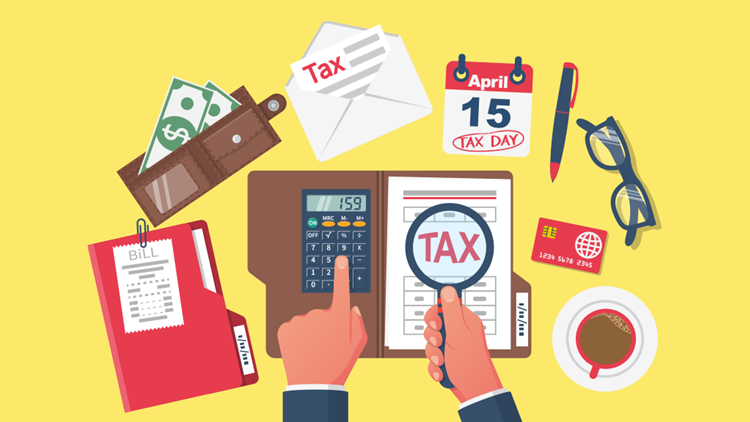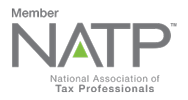by | Oct 5, 2021 | Tax Tips and News
Taxpayers with foreign bank or financial accounts are being reminded that time is running out to file the yearly report of their holdings.
The annual Report of Foreign Bank and Financial Accounts (FBAR) is due on Oct. 15.
The deadline applies to any U.S. citizens, resident aliens or any domestic legal entity holding bank or other financial accounts outside the country.
Originally, the deadline for filing the FBAR was April 15 of this year, but late filers got an automatic extension to file until Oct. 15.
Taxpayers did not have to request the extension.
However, those taxpayers who live in a federally designated disaster area—such as a location hit by a hurricane or tornado—may have their FBAR filing date delayed even further, but should consult the latest FBAR Relief Notices for information specific to their area.
Who should file?
Taxpayers are required by the Bank Secrecy Act to file an FBAR if:
- The taxpayer has a financial interest in, signature authority or other authority over one or more accounts, such as a bank or brokerage account, mutual fund or other financial account located outside the United States, and
- The aggregate value of all their foreign financial accounts exceeds $10,000 at any time during the calendar year.
The Internal Revenue Service wants all U.S. persons or entities who have foreign accounts—even relatively small ones—to see if the filing requirements apply to them.
The IRS defines a “U.S. person” as a citizen or resident of the U.S. This definition also encompasses domestic legal entities, including partnerships, corporations, limited liability companies, estates and trusts.
Filing the FBAR has to be done electronically with the Financial Crimes Enforcement Network, known as FinCEN. Taxpayers are required to use the BSA E-Filing System website to file their FBAR. The report should not be filed with a federal income tax return.
If taxpayers cannot e-file their FBAR, they should call FinCEN at 800-949-2732; taxpayers calling from outside the U.S. should call 703-905-3975.
Simply not filing an FBAR should not be considered an option when the report is required. Those who attempt to avoid filing could face considerable civil and criminal penalties – including fines and prison time.
However, the IRS says it will not penalize a taxpayer who reported an account properly on a late-filed FBAR, if the agency finds a reasonable cause for the missed deadline.
For more information on the FBAR and filing the report, see these resources:
Source: IR-2021-196
– Story provided by TaxingSubjects.com
by | Oct 4, 2021 | Tax Tips and News
Much has been made recently of the Child Tax Credit. And what’s not to like? This refundable credit could be worth thousands of dollars in refund and recent legislation allows advance payments to qualified taxpayers.
But what if a taxpayer’s dependents just don’t qualify for the Child Tax Credit?
The Internal Revenue Service there’s a credit for those dependents too: the aptly named Credit for Other Dependents.
While not quite as beneficial as the Child Tax Credit—it’s worth $500 for each dependent that qualifies—the Credit for Other Dependents still gives some measure of help to taxpayers who might otherwise go without.
Like most tax credits, there are conditions for qualifying, including:
- Dependents who are age 17 or older.
- Dependents who have individual taxpayer identification numbers.
- Dependent parents or other qualifying relatives supported by the taxpayer.
- Dependents living with the taxpayer who aren’t related to the taxpayer.
Taxpayers will see a reduction in the credit if their income is more than $200,000. The phase-out for married couples filing jointly is $400,000.
Taxpayers can claim the Credit for Other Dependents if the person claimed for the credit is a dependent on the taxpayer’s tax return. The dependent being claimed, however, cannot be used to claim either the Child Tax Credit or the Additional Child Tax Credit.
Any dependent claimed for the Credit for Other Dependents must be a U.S. citizen, U.S. national or a resident alien.
Taxpayers can claim this credit along with the Child and Dependent Care Credit and the Earned Income Credit.
The Instructions for Form 8812 can help taxpayers decide if they can claim the Credit for Other Dependents.
For more information, check out:
Source: IRS Tax Tip 2021-144
– Story provided by TaxingSubjects.com
by | Sep 30, 2021 | Tax Tips and News
The Internal Revenue Service is instituting a user fee for estates seeking an estate tax closing letter. At the same time, however, the agency is reminding estates there’s another path that avoids the fee altogether.
The new user fee—a $67 charge for providing a closing letter for an estate’s federal income tax return—goes into effect Oct. 28. The final regulations on the fee are laid out in TD 9957 in the Federal Register.
Previously, such closing letters were provided free of charge; however, federal agencies are required by law to charge a user fee in instances where certain public services provide special benefits to the recipient. Federal agencies have to reassess the fees every two years to see if they are, indeed, recovering the cost of the service.
Closing letters, showing information from the estate’s income tax return, can be helpful to the estate’s executor but aren’t required by law. The IRS concluded that issuing closing letters is one of those services that provides a special benefit—and it warrants a user fee.
In closing the door to free closing letters, though, the IRS opened a window to the estates.
The escape plan comes in the form of free account transcripts, which deliver information from the estate’s tax return similar to that in a closing letter. Transcripts are free from the IRS.
The final regulations in TD 9957 say that account transcripts can be used to confirm that an examination of the estate’s return has been completed and the IRS file has been closed – which would negate the need for a request for a closing letter.
For those who believe an IRS closing letter is still needed, the request can only be made through Pay.gov.
The IRS expects to provide more procedural details on the new user fee before it goes into effect Oct. 28.
Source: IR-2021-194
– Story provided by TaxingSubjects.com
by | Sep 29, 2021 | Tax Tips and News
Farmers and ranchers hard-hit by drought in parts of the U.S. have gotten a little help from the Internal Revenue Service.
While the IRS couldn’t make it rain, it did give affected producers an additional year to replace livestock and defer tax from any forced sale of animals because of the drought.
Currently, the National Drought Mitigation Center shows much of the western half of the country is being scorched by drought conditions.
Notice 2021-55, found on IRS.gov, lists areas in 36 states and one U.S. territory that have been designated as eligible for federal assistance due to drought. Counties adjacent to those formally designated are also eligible for assistance.
How do farmers and ranchers qualify for this IRS relief?
Eligible farmers or ranchers must have sold off livestock on account of drought conditions in a federally designated area. Generally, the IRS relief measure applies to the capital gains that eligible owners get from livestock sales on animals for draft, dairy or breeding purposes.
Other livestock, such as animals raised for slaughter or for sporting purposes, or poultry, are not eligible.
Eligible sales also have to satisfy a specific set of conditions; they have to be due only to drought and within one of the federally declared assistance areas.
Within these designated areas, producers have four years to replace livestock disposed of in a forced sale due to the drought. Normally, they would have just two years to replace their herds.
The latest extension from the IRS gives producers until the end of their first tax year after the first drought-free year to replace livestock sold due to the drought. Notice 2006-82 has more details on how the provision works.
The relief is available to farmers or ranchers who were forced to sell off livestock in an eligible area due to exceptional, extreme or severe drought between Sept. 1, 2020, and Aug. 31, 2021.
What areas qualify are determined by the National Drought Mitigation Center at the University of Nebraska-Lincoln.
Because of the extra year provided by the IRS extension, the drought-sale replacement period due to expire on Dec. 31 of this year for some eligible producers now extends to the end of their next tax year.
The IRS says because the drought in parts of the West has been ongoing for some years, this relief impacts some emergency sales dating as far back as 2017.
For more information on reporting drought sales and other farm-related tax questions, see Publication 225, Farmer’s Tax Guide, on the IRS website.
Source: IR-2021-193
– Story provided by TaxingSubjects.com
by | Sep 28, 2021 | Tax Tips and News
Taxpayers now know the private firms that could come calling to collect tax debt after September 23, 2021. This latest announcement from the Internal Revenue Service marks the fifth year the agency has used private debt collectors for overdue taxes.
Which private collection agencies received a contract from the IRS?
The IRS says that three private collection agencies (PCAs) have been given contracts: CBE Group, Inc.; Coast Professional, Inc.; and ConServe. While these firms have authorization to collect outstanding tax debt, the IRS provides two assurances to wary taxpayers:
- Employees of these collection agencies must follow the provisions of the Fair Debt Collection Practices Act, and like IRS employees, must be courteous and must respect taxpayer rights.
- Private firms are not authorized to take enforcement actions against taxpayers. Only IRS employees can take these actions, such as filing a notice of Federal Tax Lien or issuing a levy.
Once taxpayers are contacted by a PCA, they can work with that firm to settle up with the IRS—from one-time payments to payment plans. That said, the agency reminds that all payments must be made to the IRS or U.S. Treasury, and no PCA is allowed to “take enforcement actions against taxpayers,” like “filing a notice of Federal Tax Lien or issuing a levy.”
How will taxpayers know they’ve been referred to a private collection agency?
Taxpayers whose tax debt has been referred to a private collection agency will receive two letters explaining the situation: one from the IRS and another from the assigned PCA.
The IRS letter includes “the name and contact information for the PCA” and “a copy of Publication 4518, What You Can Expect When the IRS Assigns Your Account to a Private Collection Agency;” both letters “will contain information that will help taxpayers identify the tax amount owed and assure taxpayers that future collection agency calls they may receive are legitimate.”
The IRS closes with the following links containing more information about the private tax debt collection program:
To read the full press release, follow the source link below.
Source: IR-2021-191
– Story provided by TaxingSubjects.com
by | Sep 25, 2021 | Tax Tips and News
The American job market is a changing landscape these days. A year ago, the big push was to retain workers in the midst of the COVID-19 pandemic. Now the need is to find new workers to staff a growing economy.
To help do just that, the Internal Revenue Service points to the work opportunity tax credit, which was extended by recent legislation all the way through the end of 2025.
This tax credit isn’t new. It encourages employers to hire from any of 10 targeted groups who historically face big hurdles in finding jobs. These targeted groups are:
- Temporary Assistance for Needy Families recipients
- Qualified unemployed veterans, including disabled veterans
- Formerly incarcerated individuals
- Designated community residents living in Empowerment Zones or Rural Renewal Counties
- Vocational rehabilitation referrals
- Summer youth employees living in Empowerment Zones
- Supplemental Nutrition Assistance Program recipients
- Supplemental Security Income recipients
- Long-term family assistance recipients
- Long-term unemployment recipients
The IRS says it shouldn’t be a surprise that long-term unemployment recipients are on the list, since millions of people were out of work at one time or another over the span of the pandemic.
How does an employer qualify for the credit?
An employer seeking to qualify for the work opportunity tax credit has to first request the certification from their state. They should submit IRS Form 8850, Pre-Screening Notice and Certification Request for the Work Opportunity Credit to their state workforce or employment agency. Do not submit this form to the IRS.
Employers usually have 28 days to submit Form 8850 to their state agency after the eligible new hire starts work. If the hire falls into one of two special categories, though, there’s an extension at play.
If the new employee is either a qualified summer youth employee living in an Empowerment Zone; or a designated community resident living in an Empowerment Zone, then the employer has until Nov. 8, 2021 to submit Form 8850 to the state. The new hires have to start work between January 1 and October 9 in order to qualify for the extended deadline.
See Notice 2021-43 and the instructions for Form 8850 for other requirements and details.
How does an employer claim the work opportunity credit?
The work opportunity credit is claimed by the eligible employer when they file their federal income tax return.
The credit is calculated on Form 5884, Work Opportunity Credit, based generally on the wages paid to their eligible workers in their first year on the job.
Once calculated, the credit amount is claimed on Form 3800, General Business Credit.
It should be noted that tax-exempt organizations can only claim the work opportunity credit for hiring qualified veterans. These tax-exempt employers can use Form 5884-C, Work Opportunity Credit for Qualified Tax Exempt Organizations, to claim the credit against payroll taxes. However, for these employers, the credit is limited to the amount of the business income tax liability or Social Security tax owed for tax-exempt organizations.
Source: Renewed work opportunity tax credit can help employers hire workers
– Story provided by TaxingSubjects.com











